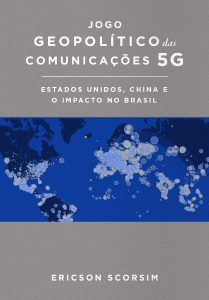Ericson Scorsim. Lawyer and Consultant in Communication Law, with a focus on Technologies, Media, and Telecommunications. Ph.D. in Law from the University of São Paulo (USP). Author of the book “Jogo geopolítico das comunicações 5G – Estados Unidos, China e impacto sobre o Brasil” (The Geopolitical Game of 5G Communications – United States, China, and Impact on Brazil), published on Amazon.
The U.S. Department of Justice has approved new standards for the National Security Agency regarding the collection of intelligence signals (SIGINT), called DoD Manual S-5240.01-A. Intelligence signals are any kind of information of interest to the national security of the United States, such as phone calls, e-mails, data, videos, audios, content on social networks, telegrams, radio frequency communications, credit card data, financial data, radar information, among other information.
The act is based on Executive Order n. 12.333, passed by the Reagan administration. The National Security Agency of the United States is subordinated to the Department of Defense, which contributes to military operations in addition to the intelligence services. Basically, intelligence signal collection refers to obtaining information, data, and communications abroad and from foreigners. Thus, the National Security Agency can target foreign governments, agents, and companies.
The collection of intelligence signals can occur through the interception of radio communication channels, e-mails, satellites, submarine cables, among other techniques. U.S. citizens can only be the target of intelligence signal collection measures exceptionally. The fact is that the NSA has the ability to intercept communications anywhere in the world. The agency can also hack into computer networks anywhere in the world. Moreover, this government agency has the power to intercept cellular phone networks as well as wireless communications. Thus, any cell phone, anywhere on the globe, can be targeted by the NSA, in principle.
The collection of foreign communications serves to access the intelligence and counterintelligence services of other countries. This allows NSA to retain the metadata of communications such as telephone numbers, identification of the source and recipient of calls, e-mail addresses, identification of senders and recipients of messages.
The government act authorizes foreigners’ electronic surveillance, even if they are located outside the United States. The techniques for collecting intelligence signals based on computer monitoring are secret. A detailed study by David Kris called “The NSA’s New SIGINT” was published on the Lawfare website on January 13, 2021. We also recommend reading another historical study of the relations between NSA and telecommunication companies and technology providers: Susan Landau: Under the radar: NSA’s efforts to secure private-sector telecommunications infrastructure, published in the Journal of National Security Law & Policy, vol. 7, pages 411-442. The author presents the historical debates regarding cryptography.
As you can see, the U.S. government’s act intends to have extraterritorial effects, extending its jurisdiction to reach other countries. In 2013, Brazil had its communications intercepted by the National Security Agency. Among the targets were the Presidency of the Republic, Ministries, Embassies, and Petrobras. Ultimately, it is up to Brazil and Brazilian companies to assess this new measure’s geopolitical impact regarding NSA’s actions concerning the protection of its sovereignty. Also, companies with international operations should measure possible geopolitical risks in the face of this new U.S. government regulation. In short, this NSA action may pose a threat to the privacy and confidentiality of communications. Therefore, there must be a debate by national parliaments and appropriate international bodies regarding the limits to the U.S. government on access, collection, interception, retention of personal and non-personal data located in other countries under the pretext of obtaining intelligence signals.
Thus, international law must evolve to contain government abuses in the interception of communications under the pretext of national security.
*All rights reserved and cannot be reproduced or used without citing the source.


